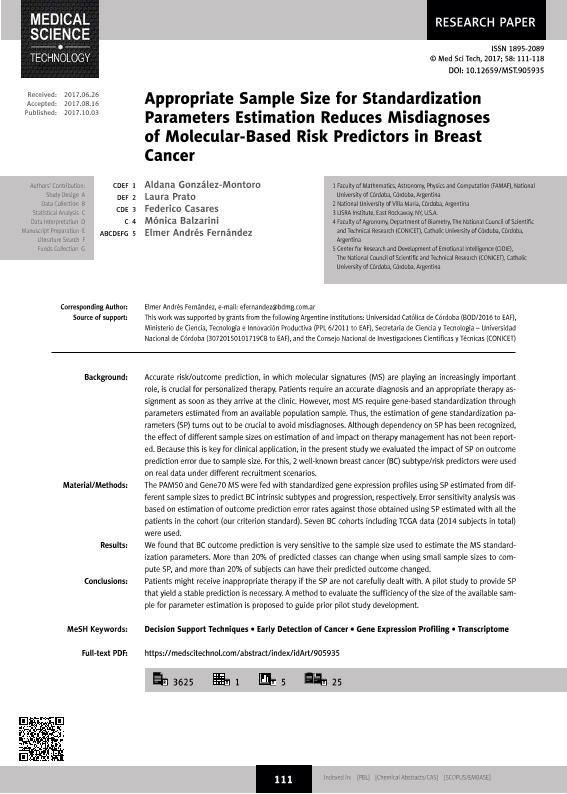Artículo
Appropriate sample size for standardization parameters estimation reduces misdiagnoses of molecular-based risk predictors in breast cancer
González Montoro, Aldana María ; Prato, Laura; Casares, Federico; Balzarini, Monica Graciela
; Prato, Laura; Casares, Federico; Balzarini, Monica Graciela ; Fernandez, Elmer Andres
; Fernandez, Elmer Andres
 ; Prato, Laura; Casares, Federico; Balzarini, Monica Graciela
; Prato, Laura; Casares, Federico; Balzarini, Monica Graciela ; Fernandez, Elmer Andres
; Fernandez, Elmer Andres
Fecha de publicación:
10/2017
Editorial:
International Scientific Information, Inc.
Revista:
Medical Science Monitor
ISSN:
1234-1010
Idioma:
Inglés
Tipo de recurso:
Artículo publicado
Clasificación temática:
Resumen
Background: Accurate risk/outcome prediction, in which molecular signatures (MS) are playing an increasingly important role, is crucial for personalized therapy. Patients require an accurate diagnosis and an appropriate therapy assignment as soon as they arrive at the clinic. However, most MS require gene-based standardization through parameters estimated from an available population sample. Thus, the estimation of gene standardization parameters (SP) turns out to be crucial to avoid misdiagnoses. Although dependency on SP has been recognized, the effect of different sample sizes on estimation of and impact on therapy management has not been reported. Because this is key for clinical application, in the present study we evaluated the impact of SP on outcome prediction error due to sample size. For this, 2 well-known breast cancer (BC) subtype/risk predictors were used on real data under different recruitment scenarios. Material/Methods: The PAM50 and Gene70 MS were fed with standardized gene expression profiles using SP estimated from different sample sizes to predict BC intrinsic subtypes and progression, respectively. Error sensitivity analysis was based on estimation of outcome prediction error rates against those obtained using SP estimated with all the patients in the cohort (our criterion standard). Seven BC cohorts including TCGA data (2014 subjects in total) were used. Results: We found that BC outcome prediction is very sensitive to the sample size used to estimate the MS standardization parameters. More than 20% of predicted classes can change when using small sample sizes to compute SP, and more than 20% of subjects can have their predicted outcome changed. Conclusions: Patients might receive inappropriate therapy if the SP are not carefully dealt with. A pilot study to provide SP that yield a stable prediction is necessary. A method to evaluate the sufficiency of the size of the available sample for parameter estimation is proposed to guide prior pilot study development.
Archivos asociados
Licencia
Identificadores
Colecciones
Articulos(CIEM)
Articulos de CENT.INV.Y ESTUDIOS DE MATEMATICA DE CORDOBA(P)
Articulos de CENT.INV.Y ESTUDIOS DE MATEMATICA DE CORDOBA(P)
Citación
González Montoro, Aldana María; Prato, Laura; Casares, Federico; Balzarini, Monica Graciela; Fernandez, Elmer Andres; Appropriate sample size for standardization parameters estimation reduces misdiagnoses of molecular-based risk predictors in breast cancer; International Scientific Information, Inc.; Medical Science Monitor; 58; 10-2017; 111-118
Compartir
Altmétricas



